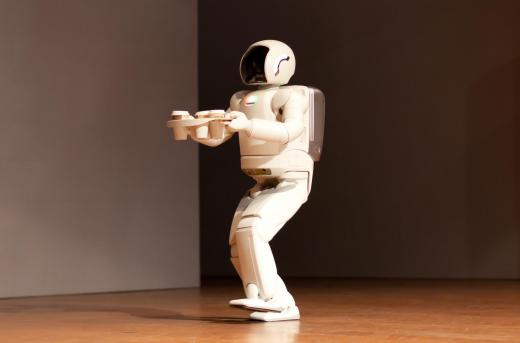What are Some Recent Advances in Artificial Intelligence?
The term artificial intelligence (AI) was first coined by computer and cognitive scientist, John McCarthy in 1956 to describe “the science and engineering of making intelligent machines.” In effect, it's the science of making machines more human-like in their thinking. A prevailing theme in pop culture and science fiction, artificial intelligence is also behind some of the most innovative advances in modern medicine, mechanics, and more.
In 2008, the Henry Ford Hospital employed the use of three-dimensional (3D) robotic instruments to surgically remove a diseased kidney. The 3D robotics procedure, which was minimally-invasive, resulted in quicker healing time, less blood loss, and a better cosmetic result. Researchers have also made recent advances in the development of robotic surgery, whereby doctors would be able to perform surgeries remotely from a computer console. Also for medical purposes, the popular Nintendo Wii video game system, which uses motion-sensing artificial intelligence, has been used to treat burn victims as part of a therapeutic stretching regiment.

Artificial intelligence has also been used in public infrastructure in recent years, in the form of robotic crawlers that are able to detect weak spots in power lines. The U.S. Military, for example, has employed the assistance of artificial intelligence in its machinery in the form of vehicles and other devices which can detect explosives autonomously.
Although it’s difficult for researchers to develop forms of artificial intelligence which accurately mimic the fluid movements of humans, bipedal robots have been developed with a special “top-heavy” balancing ability to facilitate their mobility. It seems that the biggest challenge facing researchers is to instill artificial intelligence with decision systems which would allow them to find alternative approaches not already within their framework of knowledge. Algorithms are currently in development to find a way around this problem through an active learning based approach. This would enable artificial intelligence to “learn” through mimicry of human tasks, with the ultimate goal being to create cognitive systems that can interpret human intention and predict human actions.
The future of artificial intelligence is poised on the brink of limitless exciting possibilities, which could make their way into a home, office, or neighborhood near you in the not-so-distant future.
AS FEATURED ON:
AS FEATURED ON:











Discussion Comments
@pastanaga - I think the same thing happens over and over because fiction is about conflict. I also think that our definition of intelligence is pretty narrow and that could be part of the problem. I mean, you could say that we already have fairly advanced non-human intelligence on Earth in the form of whales and bonobos and neither of those is particularly blood thirsty or eager to kill all humans (even when they know that humans are willing to kill them).
And many of the people who are heralded as being the most intelligent are people who advocate peace and understanding. So maybe the problem isn't that we might create an intelligent machine, but that we might create a self aware one who isn't intelligent.
@pleonasm - That's very optimistic, but most people talking about a true AI don't tend to be that optimistic. It's usually referred to as the singularity, when the intelligence of a machine reaches the point where it becomes self aware. Its processes would work so fast that it could reach conclusions, including that humans are a threat, before we could possibly react to its actions.
Maybe it just says something about human beings that we think any intelligence born from us would distrust us, but the same thing happens in our fiction over and over and you can't help but wonder if it is prophetic.
I've got to admit I'm happy that I've been born in a time when this kind of advance seems like it's right around the corner. I hope that proper AI arrives before I get too old to appreciate it.
I mean, just being able to converse with an intelligence that isn't human would be a privilege. It would show us things about ourselves that we've never seen before. Basically, it's as close to meeting aliens as we're ever going to get unless we actually manage to meet aliens.
Post your comments